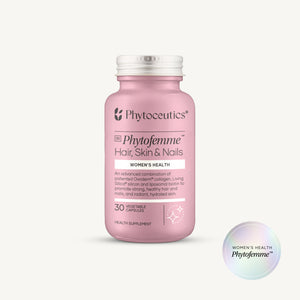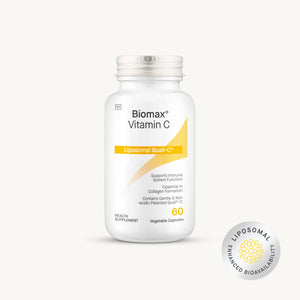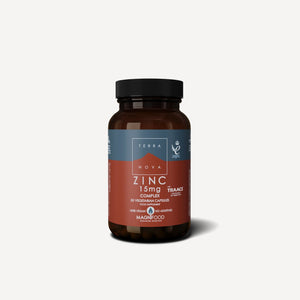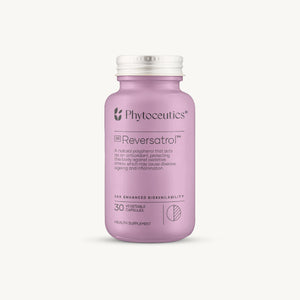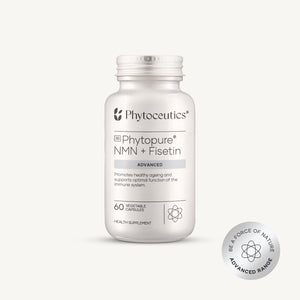The Her Health™ Podcast empowers women with science-backed insights and real conversations from female leaders in health, wellness, and science. Each conversation is designed to simplify complex topics, share personal experiences, and provide practical guidance that helps women feel empowered in their health journey. Through these real, human stories and expert perspectives, the podcast offers inspirational insights and actionable advice to support more confident, informed choices for well-being.
The Her Health™ podcast by Phytoceutics® launched its very first episode with an empowering conversation between host Laura Johnston, CEO of Phytoceutics®, and Dr. Lauren Knight, a leading dermatologist in Cape Town who specialises in medical, surgical, and cosmetic dermatology.
Setting the Stage: Why Skin Health Matters
This debut episode dives deep into the science of skin, hair, and nail health, exploring how they evolve through life’s stages – from childhood to menopause. Dr. Knight also shares her perspective on trending ingredients, supplements, and the fascinating connection between gut health and skin health. Skin health was chosen as the starting point because, as Dr. Knight put it, “your skin is the mirror of your internal health.”
Ingredients Rated by a Dermatologist
The first segment was a rapid-fire “Yes or No” session where Laura quizzed Dr. Knight on popular skincare and supplement ingredients. Her candid ratings gave listeners clarity on what’s truly worth including in a routine.
-
Vitamin C: A non-negotiable in her view. It brightens skin, evens pigmentation, stimulates collagen, and even offers DNA protection against sun damage.
-
Omega-3: Excellent for inflammation and barrier support, especially in conditions like eczema, rosacea, and acne.
-
Zinc: Anti-inflammatory and soothing, with added benefits for gut and skin health.
-
Collagen: Strong evidence for joint health, and the proof for skin benefits is still evolving. Dr. Knight admits she adds it to her coffee every morning.
-
Silicon: One to watch – Supports collagen and connective tissue.
-
Resveratrol: Systemically incredible – A gentler antioxidant alternative to Vitamin C, available both topically and in foods like berries and red wine.
-
Probiotics: Emerging as game-changers for both gut and skin microbiome balance.
Skincare Through the Ages: What Changes and Why
One of the richest parts of the conversation came when Dr. Knight explained how skin, hair, and nails evolve across life stages, and what is necessary to support them.
-
Childhood & Tweens (8–12 years)
Today, puberty often begins earlier. Increased hormones mean oilier skin, earlier acne, and more interest in skincare. For this age group, a gentle cleanser and daily sunscreen are enough, with tailored products only if acne emerges.
-
Teens & 20s
Hormonal surges dominate, often bringing acne or melasma. Oral contraceptives may also influence skin changes. By the late 20s, collagen production and hyaluronic acid stores decline, and early extrinsic damage (sun exposure, smoking, lifestyle) begins to show. Sunscreen and a targeted skincare routine focusing on protection and prevention are useful here, including antioxidants such as vitamin C or resveratrol.
-
30s
External factors such as stress, UV exposure, and diet become more visible. Fat pads in the face begin to resorb, subtly altering facial structure. Regeneration comes into play here with topical retinoids to correct some of the skin damage. Preventative care, antioxidants, and lifestyle management also become vital in preparation for perimenopause.
-
40s and Perimenopause
Hormones fluctuate unpredictably, and skin regeneration slows. A focus on replenishment and repair is key, as women prepare for menopause. How can one boost their intrinsic collagen with diet, supplementation, or in-office procedures to stimulate collagen and elastin such as microneedling and biostimulators.
-
50s and Menopause
Intrinsic and extrinsic ageing accelerate. The youthful “triangle” face shape begins to invert, skin thins, and elasticity drops. One can use retinoids for repair and regeneration, while still focusing on antioxidants for protection.
-
Throughout the ages, vitamin D supplementation is extremely important. Dr. Knight explained how most individuals do not get enough vitamin D through sunshine alone – and supplementation is key.
Supplements for Teens and Young Adults
Laura explored which supplements can help maintain healthy, radiant skin amid the hormonal changes of adolescence and early adulthood. Dr. Knight emphasised that supplements should never replace a healthy lifestyle but can offer valuable support.
Her top recommendations for tweens, teens, and young adults were:
-
Omega-3 – Reduces inflammation and supports skin barrier function.
-
Zinc – Particularly helpful for acne-prone skin.
-
Probiotics – For both gut and skin microbiome health and the gut-skin axis.
She also noted that many of her acne patients receive omega-3 and zinc alongside prescribed medication to counter side effects and enhance results.
Can Sun Damage Be Reversed?
Laura and Dr. Knight reflected on their youth, noting that using baby oil or olive oil for tanning was once a common practice. Today, the consequences are clear: more than five blistering sunburns in childhood double the risk of melanoma later in life.
The good news? Some damage can be reversed or mitigated. Supplements like nicotinamide (a form of vitamin B3) support DNA repair, and antioxidants help “mop up” sun-induced free radicals and DNA damage. Dr. Knight reassured listeners: “It’s never too late to start.”
Diet Myths: Does Chocolate Cause Acne?
No skincare discussion is complete without tackling myths. Chocolate has long been blamed for acne, but Dr. Knight explained that research is inconclusive.
-
Acne is more strongly linked to high glycaemic diets and systemic inflammation than to chocolate specifically.
-
Gut inflammation also plays a role in acne flare-ups.
-
A fascinating French study found no difference in acne rates between teens who ate chocolate and those who abstained.
The takeaway: enjoy chocolate in moderation – just be mindful of sugar’s inflammatory effects.
The Role of Probiotics in Skin Health
Laura and Dr. Knight explained the gut-skin connection, highlighting how the bacteria in our gut and on our skin play a key role in overall skin health. Imbalances – like a loss of bacterial diversity or the overgrowth of certain microbes – can lead to inflammation, breakouts, or conditions such as eczema and acne. The good news? Targeted, diverse probiotics with more than one bacteria strain can help restore balance, supporting both gut and skin health by reducing inflammation and promoting a healthy microbiome. As Dr. Knight noted – it’s not about one single bacteria; it’s about creating a healthy ecosystem.”
Your Gel Manicure: Beauty or Nail Sabotage?
Laura and Dr. Knight discussed the impact of gel manicures on nail health, noting that while they can look beautiful, frequent use can damage the nail bed and top plate. Over-buffing, harsh removal, or improper cuticle care can lead to ridging, fractures, and even infections. UV lamps used for curing gel polish carry a small risk of skin damage or melanoma, though occasional use is generally considered low risk. Dr. Knight advised practical steps: use soak-off products, limit exposure, apply sunscreen to hands, and choose experienced nail technicians. “If it makes you feel good, occasional treatments are fine – but care and moderation are key,” she said.
Changing the Narrative on Ageing
Both Laura and Dr. Knight reflected on how perspectives on ageing are evolving. Instead of focusing only on correction, women are now embracing prevention, regeneration, and overall health.
Dr. Knight summarised beautifully: “Some things you can do a lot about, some things very little about. But as a society, it’s exciting – we’re shifting our perception of what is ageing, what is beautiful.”
Key Takeaways from Episode 1
-
Start Early: Gentle skincare in tweens and sunscreen in childhood can prevent decades of damage.
-
Supplements Help: Omega-3, zinc, and probiotics are beneficial across all ages, especially for acne-prone or inflamed skin.
-
Antioxidants Are Essential: Vitamin C, resveratrol, and nicotinamide protect against DNA damage, ageing, and protect against sun damage.
-
Gut Health Is Central: A diverse microbiome supports both skin clarity and resilience.
-
It’s Never Too Late: Even if you’ve had years of sun exposure, starting protective and restorative practices now can still make a difference.
From vitamin C serums to probiotics, and teenage acne to menopausal skin changes, this episode was a masterclass in dermatology made accessible to every woman.
As Laura promised at the start, Her Health™ isn’t just about science – it’s about real conversations with women in health. And if this debut episode is anything to go by, there’s a lot to look forward to.
Use the code HERHEALTH for 20% off your next online order.
This content is for informational purposes only and does not constitute medical advice. Always consult with your healthcare provider before starting any new supplement, especially if you are pregnant, nursing, have a medical condition, or are taking prescription or chronic medication.

